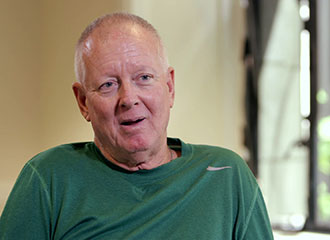What Does “Treatment” Mean for You?
4-minute read
What Does “Treatment” Mean for You?
4-minute read
What’s the first thing that comes to mind when you hear the word “treatment”?
Is it a session with a counselor? Medication? Or another proven method like prolonged exposure therapy, which empowers Veterans to work through painful memories?
In a word: Yes.
When it comes to your mental health journey, treatment can mean any one of these things or a combination of several of them. There is no one-size-fits-all method. Treatment can mean something different to every Veteran.

Professional treatment teaches positive coping
For almost every mental health condition, there are several effective treatments that can help you cope with symptoms and improve your quality of life. Talk therapy or counseling, medication, self-help approaches, and peer support services all have proven benefits. Working with your provider, you can determine the right approach for you.
“I found that individual counseling kind of works best for me,” says Craig, a U.S. Navy Veteran who faced depression and substance use issues after leaving the service. “Things that were helpful for me in that individual counseling was probably just knowing that you’re the master of your own fate, and you do have control, and you do have self-esteem. And [you] kind of work through your anger. So I started exercising a lot, and working out, and taking a little better care of myself.”
For Rachel, who was deployed to Saudi Arabia during the Gulf War, treatment has meant a multipronged approach. She had nightmares and trouble sleeping after retiring from the service. A bad thunderstorm would leave her curled up on the floor, rocking. She worried about the safety of herself and her family.
Through VA, Rachel began to see a counselor. They increased the frequency of her visits — and worked in sessions with a psychiatrist as well.
“I went and saw my psychiatrist, and now I have some wonderful medicine that allows me to sleep for six to seven hours in a row — and not have nightmares,” Rachel says. “I still see my counselor once every three months or so, but it’s on an at-need basis.”
Types of Care
These treatment options can work independently or in combination with each other to address a mental health challenge:
- Therapy or counseling can help you learn new ways of thinking, practice positive behaviors, and take active steps to move beyond your symptoms. Therapy may be one-on-one, in a group, with your family, or in some combination of these approaches — either in person or remotely via telehealth. Your counselor might recommend one of VA’s effective and innovative approaches, such as cognitive behavioral therapy or eye movement desensitization and reprocessing.
- Medications work in various ways to manage the chemicals in your brain that may affect the way you feel.
- Self-help approaches may be used to support other treatments. They may include participating in 12-step meetings and using apps or other tools suggested by your provider. VA has developed effective web-based training tools and apps for Veterans to use in concert with their treatment.
- Peer support services can be a powerful resource, allowing Veterans who have experienced mental health challenges to support one another.
That peer support proved to be pivotal for Bill, a U.S. Marine Corps Veteran.
“When I go to the Vet Center, it’s a group with all Vietnam Veterans, combat Vets,” he says. “And they all have the same problems that we all have. And we talk. And we laugh. And we talk about our problems and it helps. It’s like a family.”
To learn more about the types of treatment for specific symptoms and conditions, check out VA’s guide to mental health services.

